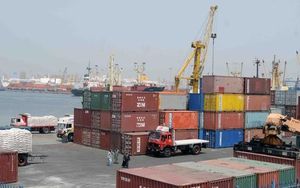Indonesia has taken a significant step in expanding its herbal commodity exports with the recent shipment of Kratom (Mitragyna speciosa) to India. The Indonesian Quarantine Agency (Barantin), through the Banten Quarantine at Soekarno-Hatta Airport, confirmed that 100 kilograms of Kratom, valued at Rp 50 million, has successfully met all necessary export requirements.
On Saturday, April 19, 2025, Duma Sari, the Head of Banten Quarantine, announced that this shipment marks the first export of Kratom to India. This milestone is seen as a positive initial step for businesses looking to broaden their market reach for herbal products internationally.
"This first export to India is a positive initial step for business actors in expanding the market for herbal commodities abroad," Duma said in a written statement. She emphasized the commitment of Banten Quarantine to support and facilitate the export process, ensuring the quality and safety of commodities from production to the point of departure from Indonesia.
The export of plants and plant products, including Kratom, is governed by Law No. 21 of 2019 and Government Regulation No. 29 of 2023, which stipulate that such exports must be accompanied by a Phytosanitary Certificate (PC). This certification is crucial to meet the requirements of the destination country.
Duma further explained that according to the Regulation of the Minister of Trade Number 21 of 2024 concerning Export Policies and Regulations, Kratom can be exported in powder form and as crushed leaves of a size greater than 30 mesh or less than or equal to 600 microns. The regulatory instruments involved include Registered Exporter (ET), Export Approval (PE), and Surveyor Report (LS).
All commodities intended for export must comply with the technical and administrative requirements of the destination country and must be free from quarantine pest organisms. "After inspection, the 100 kg of Kratom was declared fit for export," Duma stated.
In addition, Duma highlighted that the quarantine service for plant exports, such as Kratom, can only be provided after receiving an Import Permit or other official documents from the relevant authorities in the destination country. These documents must confirm that Kratom is not a prohibited commodity in that country and that the applicant has fulfilled the requirements for ET, PE, and LS.
Ensuring biosecurity and biosafety is a priority for the Banten Quarantine Agency, which implements a series of strategic steps, procedures, and control measures aimed at protecting the health of animals, fish, plants, and the environment from pest and disease threats. This commitment to safety plays a crucial role in fostering trust in Indonesian exports.
The successful export of Kratom to India not only opens up new markets for Indonesian herbal products but also reflects Indonesia's growing role in the global herbal commodity trade. As the demand for natural and herbal products continues to rise worldwide, Indonesia's rich biodiversity positions it as a key player in this sector.
As the country moves forward with its export initiatives, the Banten Quarantine Agency remains dedicated to ensuring that all products meet international standards and regulations, paving the way for further growth in Indonesia's export market.
This development is part of a broader strategy to enhance Indonesia's agricultural and herbal exports, which are vital for the country's economy. By adhering to strict guidelines and regulations, Indonesia aims to establish itself as a reliable supplier of high-quality herbal products on the international stage.
In conclusion, the first export of Kratom to India is a significant milestone for Indonesia, showcasing the potential of its herbal industry and the commitment of its regulatory bodies to support and facilitate trade while ensuring compliance with international standards.




